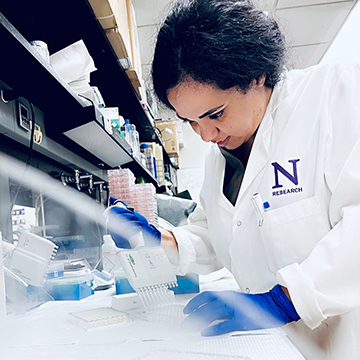From Science Immersion Program to Pursuits in Science
When Nahid Irani enrolled in Northwestern University’s Science Immersion Program (SIP) in the summer of 2023, she anticipated gaining practical laboratory skills through hands-on research experience. What she didn’t fully foresee was how the program would influence her future in molecular biology and immunology, ultimately contributing to groundbreaking research in mRNA vaccines. A research fellow in Michael J. Stern’s lab at Northeastern Illinois University, Irani credits the SIP experience as pivotal to her academic and professional growth.
Managed by the Northwestern University Clinical and Translational Sciences (NUCATS) Institute, SIP was created to provide masters-level students with a unique opportunity to engage in paid laboratory experiences.
Irani found the uplifting environment of SIP to be particularly gratifying. She credits the program’s engaging synergy as instrumental to her academic development in both group and independent research experimentation.

I particularly enjoyed conducting independent research experiments, which significantly strengthened my critical thinking and problem-solving skills.”
“My favorite aspect of the program was the collaborative research environment, where I had the opportunity to work closely with researchers, postdoctoral fellows, and PhD students on various projects,” she says. “I particularly enjoyed conducting independent research experiments, such as CXCL10 modulation and vaccine comparison studies, which significantly strengthened my critical thinking and problem-solving skills.”
Motivated by her “incredibly rewarding“ time at SIP, Irani chose to continue her research internship last summer with Pablo Penaloza-MacMaster, PhD. The extension allowed her to strengthen her expertise and contribute substantially to ongoing research initiatives. Her role in Penaloza-MacMaster's lab involved critical tasks such as conducting vaccine efficacy studies to assess immune responses and employing techniques to evaluate immune responses. Irani also assisted with mRNA vaccine dose-dependent experiments to optimize vaccine efficacy and immune response.
She was co-author on a high-impact research discovery that showed that administering an antibody treatment four days after mRNA vaccination enhanced immune responses and vaccine efficacy in mice. The study was published in The Journal of Clinical Investigation.
“I was incredibly fortunate to receive exceptional mentorship from Dr. Penaloza-MacMaster and the entire lab team — Dr. Tanushree Dangi, Dr. Kelvin Lew, Dr. Sarah Sanchez, and Dr. Bakare Awakoaiye — they were patient and encouraging throughout my learning journey,” Irani says. “This experience was both intellectually stimulating and deeply fulfilling, and I am truly grateful for their guidance and encouragement.”
Fostering both professional growth and personal gratitude, Irani views programs like SIP as an exceptional pathway for aspiring medical professionals. Her experience demonstrates the transformative power that the program can hold for students aiming to make substantial contributions to scientific progress when equipped with unparalleled research and mentorship tools.
Written by Alex Miranda




